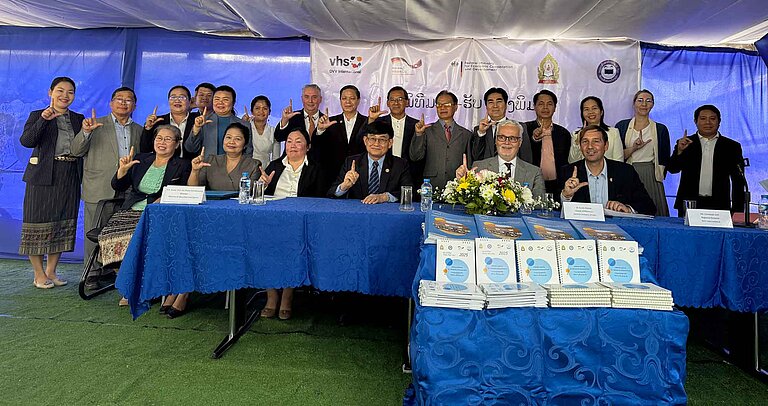About DVV International Laos

The regional office of DVV International in Laos was established in 2009. After the destruction of the country during the civil war of 1953–1975 and a decade of political isolation following the Vietnam War, the People’s Republic of Laos is now experiencing a period of peace and regional integration.
Unfortunately, after a promising period of growth, the Laotian economy has fallen into a massive debt crisis due to the Covid-19 pandemic, prompting increasing numbers of people to emigrate and creating major difficulties for the education system. School dropout rates continue to rise, as many young people have to contribute to their family’s income, and the weak rural infrastructure makes access to secondary schools difficult.
The government and many development partners are focusing their efforts on primary education and vocational training. The higher education system and, in particular, non-formal education are significantly less developed, although it is imperative to also enhance these structures due to rising school dropout rates and the urgent need to teach people of all ages modern everyday skills.
Main focus of work
- Dialogue on policy and consulting: DVV International supports the Department of Non-Formal Education in the Ministry of Education in implementing the Lifelong Learning Decree adopted in 2020, in particular with the aim of raising awareness of the topic beyond the education sector and enabling high-quality continuing education across sectors. At a political level, implementation is being carried out by a newly established steering committee in which almost all of the country’s ministries are involved. This process is enhanced by studies and conferences with domestic experts as well as the international network of the German Adult Learning and Education Association (Deutscher Volkshochschul-Verband).
- Teacher training: In cooperation with the Faculty of Education at the National University, the topic of lifelong learning is being integrated in teacher training. Formal cooperation between the faculty and the Department of Lifelong Learning at Chulalongkorn University is also underway in order to facilitate exchange and mutual learning.
- Digitalisation and curriculum planning: DVV International supports the Non-Formal Education Development Centre in the development and piloting of virtual teaching and learning materials for the state-funded equivalence programme. This is primarily done by developing new content for a mobile application (EdApp), accompanied by a dialogue on political strategy with the Ministry of Education to ensure sustainable use and funding. In addition, non-formal education approaches that have been developed and tested in recent years with the support of DVV International are being transferred into state-recognised curricula for non-formal education.
- Educational centres: DVV International supports the targeted promotion of four model centres at the community level. This includes needs assessments, further training for staff, equipment and, last but not least, courses for basic education and the acquisition of simple vocational skills. Particular attention is paid to linking income-generating measures with other topics in an integrated approach. There are also special courses to empower women.
Partners
DVV International’s most important partner is the Department of Non-Formal Education in the Ministry of Education and the Non-Formal Education Development Centre, which reports to the Ministry of Education and is responsible for the development of curricula, training in the non-formal education sector and the creation of teaching and learning materials. DVV also engages in crucial collaboration with the Faculty of Education of the National University of Laos, which promotes the concept of lifelong learning through teacher training at teacher training colleges in the formal education sector. DVV International also cooperates with the Lao Youth Union, in particular to develop and implement soft skills and life skills concepts. DVV International joins the Ministry of Education and all important national and international donors to discuss education projects as a member of the Education Sector Working Group.

Contact person at DVV International
Regional Office in Vientiane:
Christoph Jost
E-mail: jost@dvv-international.la
Laos, the only landlocked country in Southeast Asia, is ethnically very diverse
Its population comprises 49 officially recognized ethnic groups. In 1954, Laos gained its independence from French Indochina. The ensuing 20-year civil war came to an end in 1975 when power was seized by the communist popular front, the Pathet Lao, which was succeeded by the Lao People's Revolutionary Party (LPRP).
Although Laos remained officially neutral during the Vietnam War, Viet Cong supply routes which passed through the country were the target of massive bombing by the USA. Nearly a ton of bombs per inhabitant were dropped over the course of the war, leaving Laos the most heavily bombed country per capita in the world. Landmines and unexploded ordnance are still a severe problem today, also for development cooperation. In all likelihood it will still take decades of work to clear the minefields.
Laos has remained largely cut off from the dynamic economic development of its neighbouring countries - China, Thailand and Vietnam. It is one of the world's least developed countries. Considering that nearly a third of the population lives below the national poverty line, poverty reduction is the overarching objective of Lao-German development cooperation.


